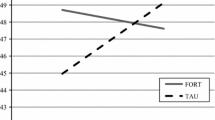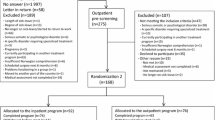Abstract
Orthopedic rehabilitation programs utilizing a multidisciplinary approach invite a greater appreciation for the factors which influence the recovery process. This study evaluated variables associated with the psychosocial adjustment of work hardening program participants when exposed to Solution-Focused psychotherapy. Orthopedic patients receiving workers’ compensation were engaged in a work hardening program in which they received either Solution-Focused therapy or the standard rehabilitation protocol. Patients and spouses completed questionnaires designed to evaluate psychosocial coping and adjustment to a medical condition. Patients across all investigated orthopedic categories demonstrated enhanced adjustment to their condition when treatment groups were compared with control groups. It is proposed that Solution-Focused therapy, in conjunction with work hardening protocols, is effective for patients when developing effective coping responses to the stressors associated with orthopedic rehabilitation.
Similar content being viewed by others
References
Feuerstein M, Callan-Harris S, Hickey P, Dyer D, Armbruster W, Carosella A. Multidisciplinary rehabilitation of chronic work related upper extremity disorders.J Occup Med 1993; 35(4): 396–403.
Niemyer LO. Social labeling, stereotyping, and observer bias in workers’ compensation: The impact of provider-patient interaction on outcome.J Occup Rehab 1991; 1(4): 251–269.
Feuerstein M, Menz L, Zastowny T, Barron B. Chronic back pain and work disability: Vocational outcomes following multidisciplinary rehabilitation.J Occup Rehab 1994; 4(4): 229–251.
Simmonds M, Kumar S. Does knowledge of a patient’s workers’ compensation status influence clinical judgements?J Occup Rehab 1996; 6(2): 93–107.
Himmelstein J, Feuerstein M, Stanek E, Koyamatsu K, Pransky G, Morgan W, Anderson K. Work-related upper extremity disorders and work disability: Clinical and psychosocial presentation.J Occup Environ Med 1995; 37(11): 1278–1286.
Feuerstein M, Thebarge R. Perceptions of disability and occupational stress as discriminators of work disability in patients with chronic pain.J Occup Rehab 1991; 1(3): 185–195.
de Shazer S.Putting difference to work. New York: Norton, 1991.
de Shazer S.Words were originally magic. New York: Norton, 1994.
Petersen M. Nonphysical factors that affect work hardening success: A retrospective study.J Orthop Sport Phys Ther 1995; 22(6): 238–246.
Voaklander D, Beauline A, Lessard R. Factors related to outcome following a work hardening program.J Occup Rehab 1995; 5(2): 71–85.
Flinn-Wagner S, Mladonicky A, Goodman G. Characteristics of workers with upper extremity injuries who make a successful transition to work.J Hand Ther 1990; 3: 51–55.
Carosella A, Lackner J, Feuerstein M. Factors associated with early discharge from multidisciplinary work rehabilitation program for chronic low back pain.Pain 1994; 57: 69–76.
Velozo C, Lustman P, Cole D, Montag J, Eubanks B. Prediction of return to work by rehabilitation professionals.J Occup Rehab 1991; 1(4), 271–280.
Riikonen E. Problem models and interviewing practices in professional helping: From problem language to competence language.Psychiat Fenn 1993; 24: 143–151.
Ahlers C. Solution-oriented therapy for professionals working with physically impaired clients.J Syst Ther 1992; 11(3), 53–68.
Madsen W. Problematic treatment: Interaction of patient, spouse, and physician beliefs in medical noncompliance.Fam Syst Me 1992; 10(4): 365–383.
Shapiro J. The use of narrative the doctor-patient encounter.Fam Syst Med 1993; 11(1): 47–53.
Campbell D, Stanley J.Experimental and quasi-experimental designs for research. Chicago, IL: Rand McNally, 1966.
McCubbin H, Olson D, Larsen A. Family crisis oriented personal evaluation scales. In: McCubbin H, ed.Family assessment for research and practice. Madison: University of Wisconsin, 1982, pp. 194–207.
Derogatis L.The psychosocial adjustment to illness scale. Baltimore, MD: Clinical Psychometric Research, 1983.
Bureau of Labor Statistics.Occupational injuries and illnesses: Counts, rates, and characteristics, 1993. Washington, DC: United States Department of Labor, 1995.
Brewer C, Storms B. The final phase of rehabilitation: Work hardening.Orthop Nursing 1993; 12(6): 9–15.
Watzlawick P, Weakland J. Fisch R.Change: Principles of problem formation and problem resolution. New York: W.W. Norton, 1974.
Schulman B. Worklessness and disability: Expansion of the biopsychosocial perspective.J Occup Rehab 1994; 4(2): 113–122.
Banks M. Psychological effects of prolonged unemployment: Relevance to models of work re-entry following injury.J Occup Rehab 1995; 5(1): 37–53.
Author information
Authors and Affiliations
Rights and permissions
About this article
Cite this article
Cockburn, J.T., Thomas, F.N. & Cockburn, O.J. Solution-focused therapy and psychosocial adjustment to orthopedic rehabilitation in a work hardening program. J Occup Rehab 7, 97–106 (1997). https://doi.org/10.1007/BF02765880
Issue Date:
DOI: https://doi.org/10.1007/BF02765880




